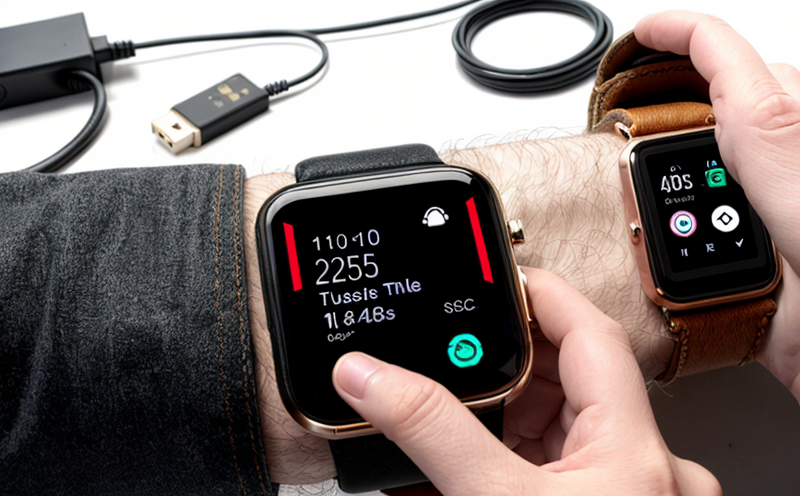UL 2054 Lithium Battery Pack Safety Testing for Wearable Products
The UL 2054 standard sets forth essential requirements and test procedures to ensure that lithium battery packs used in wearable electronics meet the highest safety standards. This testing is crucial because lithium batteries are inherently volatile, especially when they are integrated into portable or wearable products. Failures can lead to overheating, fire, or explosion, posing significant risks to users.
Our comprehensive testing service covers a wide range of scenarios that might occur during normal use and abuse conditions. This includes overcharge, short circuiting, mechanical stress, and drop tests. Understanding the specific requirements of UL 2054 is critical for any company developing wearable technology. These standards help to prevent potential hazards by ensuring that battery packs are robust against common failures.
The testing process begins with a thorough review of the design and manufacturing processes. We ensure compliance with all relevant sections of UL 2054, which include detailed instructions on how to prepare samples for testing. Once the samples are prepared, they undergo rigorous tests to simulate real-world conditions that may stress the battery pack.
Our state-of-the-art laboratory facilities use advanced equipment capable of replicating various environmental stresses, including high temperatures and humidity. This helps us assess whether the lithium batteries can withstand these conditions without compromising safety. We also conduct mechanical stress tests by subjecting the battery packs to drops from specific heights onto hard surfaces like concrete.
After completing all required tests, our team provides detailed reports that outline each step of the testing process and the results obtained. These reports are invaluable for quality managers, compliance officers, R&D engineers, and procurement specialists who need assurance that their products meet stringent safety standards. By adhering to UL 2054 guidelines, manufacturers can protect both themselves and end-users from potential hazards associated with lithium battery packs.
Our expertise extends beyond just conducting tests; we also offer guidance on how to modify designs or manufacturing processes based on our findings. This proactive approach ensures that even before products reach the market, any necessary adjustments are made to enhance safety further.
Why It Matters
The importance of UL 2054 compliance cannot be overstated in today’s fast-paced technological landscape where wearable devices play an increasingly vital role in our daily lives. With advancements come new challenges, particularly regarding the safe handling and use of lithium batteries.
- Lithium battery packs are essential components of many wearable electronics such as fitness trackers, smartwatches, and hearing aids.
- These small yet powerful batteries must be designed with safety in mind to prevent malfunctions that could result in dangerous situations for users.
- The standards outlined by UL 2054 provide a framework for manufacturers to follow when developing these products, ensuring they meet rigorous quality control measures.
- Compliance with these standards not only protects consumers but also builds trust between companies and their customers.
In addition to protecting users from risks like fires or explosions, adherence to UL 2054 helps maintain brand reputation. Consumers are more likely to purchase products that have been independently verified as safe by recognized authorities such as Underwriters Laboratories (UL).
Furthermore, meeting these safety standards is often a prerequisite for market entry in many countries and regions around the world. By ensuring compliance early on in the development process, manufacturers can avoid costly delays or rejections at regulatory checkpoints.
Applied Standards
| Standard | Description |
|---|---|
| UL 2054 | This standard establishes the essential requirements and test procedures for lithium battery packs used in electronic devices. It ensures that these batteries are safe under normal operating conditions as well as during abusive situations. |
| IEC 62133 | A similar international standard issued by the International Electrotechnical Commission, which provides additional guidance on safety aspects related to lithium-ion cells and modules used in portable electronics. |
The combination of UL 2054 and IEC 62133 ensures that our testing services cover all necessary bases for ensuring the highest level of safety for wearable electronics. By incorporating both standards into our protocols, we provide clients with confidence knowing their products are thoroughly evaluated against recognized industry benchmarks.
Environmental and Sustainability Contributions
- By promoting safe battery design practices through our testing services, we contribute to reducing the environmental impact associated with lithium battery failures.
- This service helps prevent hazardous waste generation by ensuring only compliant products enter the market. This reduces the need for costly recalls later on due to safety issues.
- The rigorous testing process also encourages manufacturers to adopt more sustainable practices throughout their supply chains, from raw material sourcing to end-of-life disposal solutions.
Our commitment to sustainability does not stop there; we continually seek opportunities to innovate within our own operations while advocating for eco-friendly approaches across the industry. Through ongoing research and development efforts, we aim to push boundaries further toward creating safer, more sustainable electronics for future generations.





